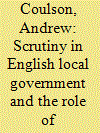|
|
|
Sort Order |
|
|
|
Items / Page
|
|
|
|
|
|
|
| Srl | Item |
| 1 |
ID:
177433


|
|
|
|
|
| Summary/Abstract |
Historically, coal has been a primary input driving China's economic growth. However, it has impacted air quality significantly and negatively in the past decades. Among all efforts and measures, the Residential Coal Switch Policy (RCSP), implemented in the 1990s, is considered the most fundamental but challenging pathway toward reducing pollution. This study offers a comprehensive policy panorama to policymakers and researchers, explaining the dynamic evolution of the RCSP under varying objectives and constraints. Based on 66 policy documents issued by the central government during the years 2012–2019, the study reviews the RCSP systematically and presents three development stages. We create an index to measure policy-enforcement intensity at each stage and find that policymakers have become more sophisticated in identifying specific target groups, increasing the use of target-management tools over time. Results indicate that most of the Beijing-Tianjin-Hebei and surrounding areas have achieved and exceeded established targets. Command and control, financial support, competitive funds, and residential willingness to pay for air quality are the primary factors related to achievement. Future challenges are also presented, including the unsustainability of subsidies, the absence of building-reconstruction investment, and the scarcity of clean energy.
|
|
|
|
|
|
|
|
|
|
|
|
|
|
|
|
| 2 |
ID:
109693


|
|
|
|
|
| Publication |
2011.
|
| Summary/Abstract |
Energy efficiency in industry plays key roles in improving energy security, environmental sustainability and economic performance. It is particularly important in strategies to mitigate climate change. The evidence of great potential for cost-effective efficiency-derived reductions in industrial energy use and greenhouse gas (GHG) emissions have prompted governments to implement numerous policies and measures aimed at improving their manufacturing industries' energy efficiency. What can be learned from these many and varied initiatives? This paper provides foundation for policy analysis for enhancing energy efficiency and conservation in industry, by surveying more than 300 policies, encompassing about 570 measures, implemented by governments in IEA countries, Brazil, China, India, Mexico, Russia and South Africa. It outlines the measures' main features, their incidence of use, and their connections with specific technical actions and key stakeholders (i.e., how and where measures affect the energy efficiency of industry). It also examines the key features underlying the measures' success: (1) potential to reduce energy use and CO2 emissions cost-efficiently; (2) ease of policy development, execution and assessment and (3) ancillary societal effects.
|
|
|
|
|
|
|
|
|
|
|
|
|
|
|
|
| 3 |
ID:
103547


|
|
|
|
|
| Publication |
2011.
|
| Summary/Abstract |
Overview and Scrutiny Committees were introduced in England and Wales in the Local Government Act 2000 that ended the role the full council and its committees as the locus of decision-making for most local authorities. Overview and scrutiny committees composed of councillors not on small decision-making executives were tasked with holding these to account. The performance of scrutiny committees is variable. Generally they work best where they concentrate on reviews of policy and practice, with recommendations following from well-researched reports. The paper reviews the difficulties which arise when scrutiny committees endeavour to hold powerful executives to account, and suggests that to strengthen this new legislation is required, in particular to institutionalise scrutiny committees as agencies of the full council, the representative body for the area, comparable to the way in which the select committees at Westminster are the agencies of the Parliament.
|
|
|
|
|
|
|
|
|
|
|
|
|
|
|
|
|
|
|
|
|